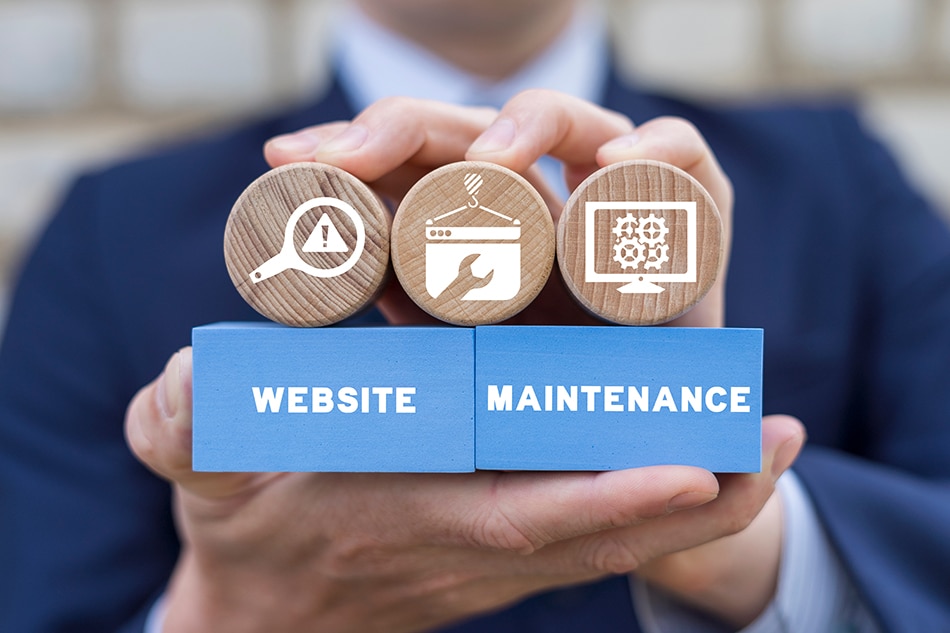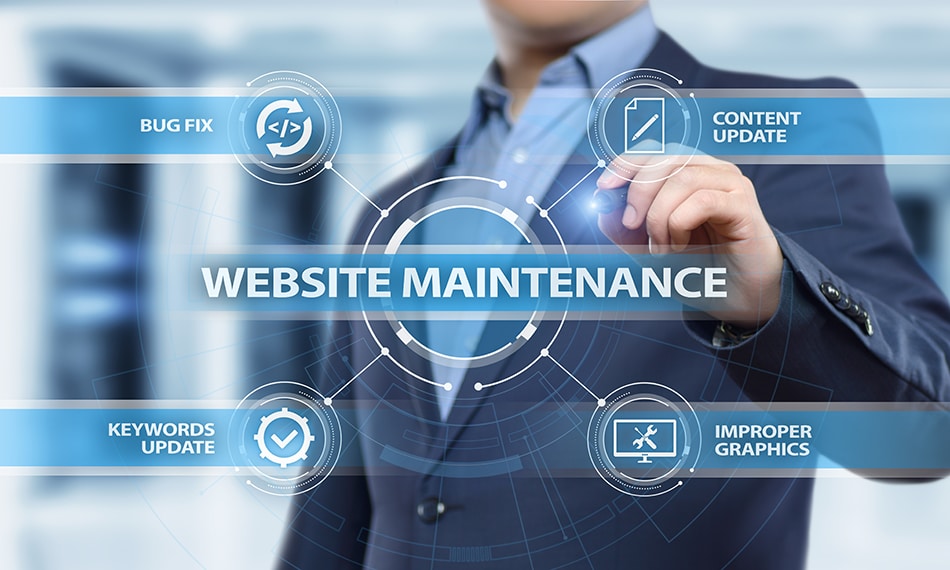Website Maintenance: A Key to Your Online Success
Website Maintenance: A Key to Your Online Success
Website maintenance is essential to ensuring that your site runs smoothly and effectively. It depends on several factors including updating content, fixing broken links, performing security updates, and monitoring performance. Without regular website maintenance, your site could become vulnerable to security threats, data loss, outdated content, and poor user experiences.
Regular content updates are also essential, whether you’re refreshing blog posts, product descriptions, or other critical information, to keep your website relevant and engaging. Enhancing your business’s online presence depends on how effectively you integrate and manage the various elements. Maintaining your website is crucial for many reasons. Websites that don’t update regularly often experience declines in performance, search engine rankings, and security concerns.
As your business grows, your website becomes a more critical tool for reaching customers, sharing information, and driving revenue. Website maintenance plans often offer different tiers to suit the varying needs of businesses.
Website maintenance is essential to ensuring that your site runs smoothly and effectively. It depends on several factors including updating content, fixing broken links, performing security updates, and monitoring performance. Without regular website maintenance, your site could become vulnerable to security threats, data loss, outdated content, and poor user experiences. Regular content updates are also essential, whether you’re refreshing blog posts, product descriptions, or other critical information, to keep your website relevant and engaging.
Enhancing your business’s online presence depends on how effectively you integrate and manage the various elements. Maintaining your website is crucial for many reasons. Websites that don’t update regularly often experience declines in performance, search engine rankings, and security concerns. As your business grows, your website becomes a more critical tool for reaching customers, sharing information, and driving revenue. Website maintenance plans often offer different tiers to suit the varying needs of businesses.
Importance of Website Maintenance
Preventative Maintenance

Website Maintenance Plans
Many businesses choose to invest in website maintenance plans, which offer a structured approach to keeping websites running smoothly. Choosing a maintenance plan that fits your business needs ensures that your website stays secure, functional, and optimized. These managed services plans typically include regular updates, security checks, performance monitoring, and sometimes, content updates. Security monitoring is crucial to continuously check for malware, hacking attempts, and other potential threats, helping to protect your site from vulnerabilities.
In addition, performance optimization is necessary to ensure your website loads quickly and runs smoothly. Routine checks can help identify any issues that may affect speed or functionality. Finally, regular backups of your website data are vital, providing a safeguard in case of any problems. With consistent backups, you can quickly restore your site and minimize downtime if an issue arises.
The cost of a website maintenance package can vary significantly based on the size, and needs of your website. Simple websites may require minimal updates and maintenance, while more complex e-commerce sites or high-traffic blogs may require more frequent updates and security monitoring. We believe website maintenance is vital to preserving the safety and longevity of a site.
Costs Associated with Website Maintenance
- Website Size: Larger websites with more content and pages require more maintenance.
- Website Complexity: Websites with advanced features such as e-commerce functionality or membership systems may require more frequent updates.
- Security Needs: Websites that store sensitive data, such as a potential customer’s payment details, may require more robust security measures.
- Content Updates: The frequency with which you update content (such as blog posts, product listings, or news articles) affects maintenance costs.
Preventative Maintenance

What Is The Cost Of Error
Website Maintenance Plans
Many businesses choose to invest in website maintenance plans, which offer a structured approach to keeping websites running smoothly. Choosing a maintenance plan that fits your business needs ensures that your website stays secure, functional, and optimized. These managed services plans typically include regular updates, security checks, performance monitoring, and sometimes, content updates. Security monitoring is crucial to continuously check for malware, hacking attempts, and other potential threats, helping to protect your site from vulnerabilities.
In addition, performance optimization is necessary to ensure your website loads quickly and runs smoothly. Routine checks can help identify any issues that may affect speed or functionality. Finally, regular backups of your website data are vital, providing a safeguard in case of any problems. With consistent backups, you can quickly restore your site and minimize downtime if an issue arises.
The cost of a website maintenance package can vary significantly based on the size, and needs of your website. Simple websites may require minimal updates and maintenance, while more complex e-commerce sites or high-traffic blogs may require more frequent updates and security monitoring. We believe website maintenance is vital to preserving the safety and longevity of a site.
Costs Associated with Website Maintenance
- Website Size: Larger websites with more content and pages require more maintenance.
- Website Complexity: Websites with advanced features such as e-commerce functionality or membership systems may require more frequent updates.
- Security Needs: Websites that store sensitive data, such as a potential customer’s payment details, may require more robust security measures.
- Content Updates: The frequency with which you update content (such as blog posts, product listings, or news articles) affects maintenance costs.
When To Schedule Maintenance

Key Reasons Why
Importance of Website Maintenance
The Role of Website Maintenance in SEO
Website maintenance plays a significant role in improving search engine rankings. A regular update depends on several factors. This includes security fixes, and performance optimization that contribute to a better user experience, which is a key ranking factor for search engines. Regularly optimizing your website helps ensure faster loading times, which is critical for both SEO and user experience. Additionally, improving mobile responsiveness is essential, as search engines prioritize mobile-friendly sites. Keeping your content fresh and relevant through regular updates not only engages users but also signals to search engines that your website is active and up-to-date. Finally, correcting errors such as broken links enhances your website’s overall performance and boosts SEO rankings, contributing to a smoother user experience and better search visibility.
Website maintenance is crucial for keeping your website secure, functional, and optimized for both users and search engines. Regular maintenance tasks, such as software updates, security checks, and content updates, help prevent potential issues and keep your website performing at its best. Investing in a website maintenance plan ensures that your site remains up-to-date and ready to serve your business’s needs. For professional website maintenance services, contact Ad House Advertising today. Our experts are here to help your website’s security and function.
Key Website Maintenance Tasks
Website maintenance involves a range of tasks that must be completed on an ongoing basis. These tasks ensure your website remains functional, secure, and optimized for search engines. Below are some of the most critical website maintenance activities:
Software and Plugin Updates
Your website likely uses a content management system (CMS) such as WordPress, Joomla, or Drupal. These platforms regularly release updates to fix bugs, improve security, and enhance features. Similarly, plugins or extensions that add functionality to your website need frequent updates.
Security Monitoring
Website security is one of the most important aspects of website maintenance. With the increasing threat of cyberattacks, businesses must take proactive measures to protect their websites. Regularly performing security scans and updates is necessary to prevent unauthorized access to sensitive data.
Content Updates and Blog Posts
A website’s content is its most valuable asset. Outdated content can drive away visitors and hurt your SEO performance. Regularly adding fresh content, such as blog posts or new product information, can keep your website relevant and engaging. In addition, it’s vital to keep up with Google and other search engines current standards for content.
Backups and Data Protection
Backing up your website is crucial to safeguard important data from server malfunctions, cyberattacks, or human errors. Regular backups allow you to restore your website quickly if something goes wrong. Schedule regular backups and store them in a secure location.
Monitoring Website Performance
Your website’s performance directly impacts the user experience. A slow or unresponsive website can frustrate visitors and increase bounce rates. Regularly monitoring performance helps you identify issues. Catching slow loading times or server outages allows you to take action before they affect your users.
Fixing Broken Links
Broken links can harm your website’s credibility and SEO rankings. They lead users to dead-end pages, frustrating their experience and making your site appear novice. Regularly checking for broken links and fixing them helps maintain a positive user experience and boosts your website’s search engine rankings.
Frequently Asked Questions About Website Maintenance

Shape Your Brand Audience With Targeted Ads

